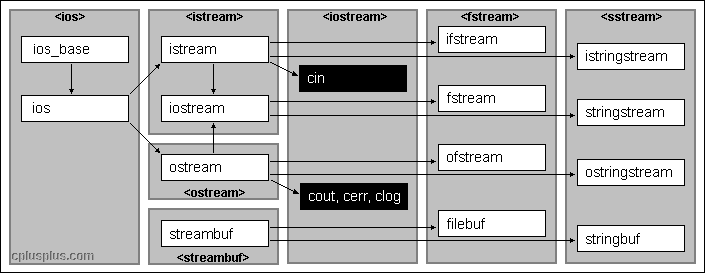C++ IO操作API及注意事项(包含一个日志类的实现)
C++是一个抽象程度比C高很多的语言,在使用C++时,编译器做了很多工作,如果我们不对C++的某些特性的实现机制进行了解,那么编程时也许会有很多疑惑,我们也许知道怎样做才是正确的,但不知道为什么要这样做,所以,学习C++时,尽量多了解下底层实现机制,多看看操作系统相关方面的知识,对我们无论是学习某个编程语言,还是弄懂程序的运行原理都是非常有益的。IO操作是属于操作系统的,并不是属于C++的,C++只是提供了一个IO操作的编程接口的标准,不同的操作系统可能有着不同的IO操作接口,但是都可以根据这些操作提供一个符合C++ IO标准的库,这样就可以在不同的操作系统上,使用C++ 统一的IO操作。
C++ IO类之间的关系

头文件 类型
iostream istream,wistream 从流中读取数据,w开头的针对wchar_t类型的
iostream ostream,wostream 向流写入数据
iostream iostream,wiostream 读写流
fstream ifstream,wifstream
fstream ofstream,wofstream
fstream fstream,wfstream
sstream istringstream,wistringstream
sstream ostringstream,wostringstream
sstream stringstream,wstringstream
输入流均继承自istream,输出流均继承自ostream,
IO对象无拷贝或赋值
ofstream out1,out2,
out1=out2; //错误,不能对IO对象赋值
ofstream out3(out2); //错误,不能用IO对象初始化IO对象
IO对象有条件状态
badbit 代表流已崩溃
failbit 代表IO操作失败
eofbit 代表流达到文件尾
goodbit 代表流未出错
s.eof() 若eofbit置位则返回true
s.fail()
s.bad()
s.good()
s.clear() 将流中所有条件状态位复位,使流有效,返回值为void
s.clear(flags) 根据flags将条件状态位置位 cin.clear(cin.rdstate() & ~cin.faibit & ~cin.badbit) 将failbit和badbit复位
s.setstate(flags) 设置流的状态
s.rdstate() 返 回流的当前状态 返回类型为strm::iostate
IO操作
#include <iostream>
#include <fstream>
using namespace std;
int main()
{
ofstream myfile;
myfile.open("example.txt");
myfile<<"this is a statement!\n";
myfile.close();
return 0;
}open (filename,mode)
文件模式
ios::in 以读的方式打开
ios::out 以写的方式打开
ios::app 以追加的方式打开,每次写操作均定位到文件末尾
ios::ate 打开文件后,立即定位到文件末尾
ios::trunc 截断文件
ios::binary 以二进制方式进行IO
out模式只能对ofstream或fstream设定
in模式只能对ifstream或fstream设定
默认情况下以out模式打开的文件同时包含trunc模式,即输出流若没指定app模式,文件中的内容会被清空。
app和ate模式有很大的区别,具体区别看这里
is_open() 可以用来判断打开文件是否成功,成功返回true;
设置流指针的位置
获得位置
streampos tellg(); //g代表该函数的操作对象是输入流,
streampos tellp(); //p代表该函数的操作对象是输出流设置位置
seekg(position);
seekp(position);
seekg(offset,direction); //相对于direction方向的偏移量,可以为:ios::end, ios::beg, ios::cur
seekp(offset,direction);
ios::beg offset counted from the beginning of the stream
ios::cur offset counted from the current position
ios::end offset counted from the end of the stream
#include <iostream>
#include <fstream>
using namespace std;
int main () {
streampos begin,end;
ifstream myfile ("example.bin", ios::binary);
begin = myfile.tellg();
myfile.seekg (0, ios::end);
end = myfile.tellg();
myfile.close();
cout << "size is: " << (end-begin) << " bytes.\n";
return 0;
} read和write
read(memblock,size);
write(memblock,size);
#include <iostream>
#include <fstream>
using namespace std;
int main () {
streampos size;
char * memblock;
ifstream file ("example.bin", ios::in|ios::binary|ios::ate);
if (file.is_open())
{
size = file.tellg();
memblock = new char [size];
file.seekg (0, ios::beg);
file.read (memblock, size);
file.close();
cout << "the entire file content is in memory";
delete[] memblock;
}
else cout << "Unable to open file";
return 0;
}getline()
输入流对象调用的函数
#include <fstream>
istream& getline( char* buffer, streamsize num );
istream& getline( char* buffer, streamsize num, char delim );
#include <string>
istream& getline( istream& is, string& s, char delimiter = '\n' );
#include <iostream>
#define MAX 100
using namespace std;
int main()
{
char cstr[MAX];
string str;
cin.getline(cstr,MAX);
cout<<cstr<<endl;
getline(cin,str);
cout<<str<<endl;
return 0;
}自己实现一个日志类
#include <iostream>
#include <fstream>
#include <memory>
#include <ctime>
using namespace std;
class EasyLog{
public:
static EasyLog* getInstance(){
if(_instance==NULL){
_instance=new EasyLog();
}
return _instance;
}
void Log(const string &str,const string& filepath);
private:
EasyLog(){}
virtual ~EasyLog(){delete _instance;}
static EasyLog* _instance;
};
EasyLog* EasyLog::_instance;
void EasyLog::Log(const string& str,const string& filepath){
time_t t;
t=time(0);
char tmp[100];
strftime(tmp,sizeof(tmp),"[%Y.%m.%d %X %A]",localtime(&t));
ofstream out(filepath,ios::app);
out<<tmp<<" : "<<str<<endl;
out.close();
return ;
}
int main(){
EasyLog::getInstance()->Log("This is a test statement","log.txt");
return 0;
}C++ IO操作API及注意事项(包含一个日志类的实现)的更多相关文章
- 一个Java文件至多包含一个公共类
编写一个java源文件时,该源文件又称为编译单元.一个java文件可以包含多个类,但至多包含一个公共类,作为编译时该java文件的公用接口,公共类的名字和源文件的名字要相同,源文件名字的格式为[公共类 ...
- 关于Django中的数据库操作API之distinct去重的一个误传
转载自http://www.360doc.com/content/18/0731/18/58287567_774731201.shtml django提供的数据库操作API中的distinct()函数 ...
- .NET中的IO操作基础介绍
关于IO简介 .NET中的IO操作,经常需要调用一下几个类. clipboard[] .FileStream类 文件流类,负责大文件的拷贝,读写. .Path类 Path类中方法,基本都是对字符串(文 ...
- Linux学习记录--文件IO操作相关系统编程
文件IO操作相关系统编程 这里主要说两套IO操作接口,各自是: POSIX标准 read|write接口.函数定义在#include<unistd.h> ISO C标准 fread|fwr ...
- springboot学习-jdbc操作数据库--yml注意事项--controller接受参数以及参数校验--异常统一管理以及aop的使用---整合mybatis---swagger2构建api文档---jpa访问数据库及page进行分页---整合redis---定时任务
springboot学习-jdbc操作数据库--yml注意事项--controller接受参数以及参数校验-- 异常统一管理以及aop的使用---整合mybatis---swagger2构建api文档 ...
- Pandas系列(十一)-文件IO操作
数据分析过程中经常需要进行读写操作,Pandas实现了很多 IO 操作的API,这里简单做了一个列举. 格式类型 数据描述 Reader Writer text CSV read_ csv to_cs ...
- 23_java之IO操作
01输入和输出 * A:输入和输出 * a: 参照物 * 到底是输入还是输出,都是以Java程序为参照 * b: Output * 把内存中的数据存储到持久化设备上这个动作称为输出(写)Output操 ...
- python之协程与IO操作
协程 协程,又称微线程,纤程.英文名Coroutine. 协程的概念很早就提出来了,但直到最近几年才在某些语言(如Lua)中得到广泛应用. 子程序,或者称为函数,在所有语言中都是层级调用,比如A调用B ...
- AI学习---数据IO操作&神经网络基础
数据IO操作 TF支持3种文件读取: 1.直接把数据保存到变量中 2.占位符配合feed_dict使用 3. QueueRunner(TF中特有的) 文件读取流程 文件读取流程(多线 ...
随机推荐
- Leetcode题解(十七)
48.Rotate Image 题目: 分析:题目意思很简单,就是将一个n*n的矩阵顺时针旋转90度. 这道题难度不大,按照旋转的过程走一遍即可.代码如下: class Solution { publ ...
- 最长上升子序列(logN算法)
例如:1 7 3 5 9 4 8 一个序列,比如说a[]={1,7,3,5,9,4,8},找出它的最长上升子序列的个数,很明显是4个,可以是{1,3,5,9},{1,3,5,8}或者{1,3,4,8} ...
- Pendant
Pendant Time Limit: 6000/2000 MS (Java/Others) Memory Limit: 32768/32768 K (Java/Others) Total Submi ...
- ELK 完整部署和使用 - 每天5分钟玩转 Docker 容器技术(90)
上一节已经部署了容器化的 ELK,本节讨论如何将日志导入 ELK 并进行图形化展示. 几乎所有的软件和应用都有自己的日志文件,容器也不例外.前面我们已经知道 Docker 会将容器日志记录到 /var ...
- c++学习笔记---04---从另一个小程序接着说
从另一个小程序接着说 文件I/O 前边我们已经给大家简单介绍和演示过C和C++在终端I/O处理上的异同点. 现在我们接着来研究文件I/O. 编程任务:编写一个文件复制程序,功能实现将一个文件复制到另一 ...
- Android 开发笔记___RelativeLayout
xml文件实现 <RelativeLayout xmlns:android="http://schemas.android.com/apk/res/android" andr ...
- 29.使用register_chrdev_region()系列来注册字符设备
1.之前注册字符设备用的如下函数注册字符设备驱动: register_chrdev(unsigned int major, const char *name,const struct file_ope ...
- Python之os.fork
[参考资料] http://www.01happy.com/python-fork-create-process/ http://www.python-course.eu/forking.php ht ...
- java获取泛型信息
总结一下java中获取与泛型相关的信息的知识,不如说是使用方法.网上也有很多类似的优秀文章,这里主要做一个知识的总结.通过反射获取泛型信息的常见例子: //bean package testProje ...
- HTTPS 传输优化详解之动态 TLS Record Size
笔者在过去分析了诸多可以减少 HTTPS 传输延迟的方法,如分布式 Session 的复用: 启用 HSTS,客户端默认开启 HTTPS 跳转:采用 HTTP/2 传输协议:使用 ChaCha20-P ...
